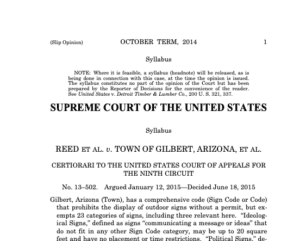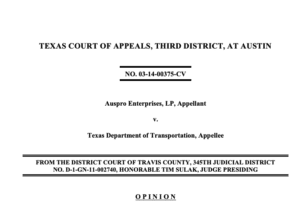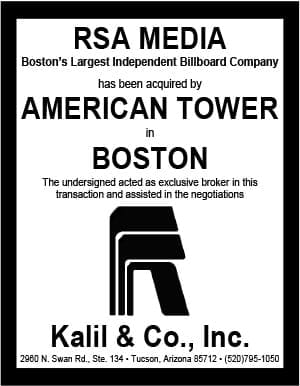
On November 6, 2019, the U.S. Court of Appeals for the Sixth Circuit denied the petition for rehearing en banc in Thomas vs. Bright. In doing so, the Federal Appellate Court set the stage for an appeal to the U.S. Supreme Court, or more likely, to a legislative fix of these content-based sign regulation disputes. The ruling also concluded a trilogy of landmark opinions by the U.S. Supreme Court and State and Federal Appellate Courts, which have dramatically affected regulation of the sign industry under the First Amendment.
The cases start with the Supreme Court’s 2015 decision in Reed vs Town of Gilbert, 135 S. Ct. 2218 (2015). In this seminal case, Pastor Reed had placed temporary signs throughout the Town of Gilbert, Arizona, on which were displayed the location and schedule for his Sunday church services. The Town imposed a variety of size, height, location, and timing restrictions on the Pastor’s signs, based on their classification as religious signs. The Town, by contrast, imposed different restrictions, exemptions, and prohibitions on other signs, in each case depending on the content displayed on the sign. In essence, therefore, the Town might be confronted with signs of identical height, size, and location, but permit the one containing a political advertisement, while prohibiting the one adverting Pastor Reed’s church services.
 In a unanimous decision, the Supreme Court held that Town’s sign code unconstitutionally based its regulations on the content displayed on the signage, observing:
In a unanimous decision, the Supreme Court held that Town’s sign code unconstitutionally based its regulations on the content displayed on the signage, observing:
“This type of ordinance may seem like a perfectly rational way to regulate signs, but a clear and firm rule governing content neutrality is an essential means of protecting the freedom of speech, even if laws that might seem “entirely reasonable” will sometimes be “struck down because of their content-based nature.”
Id. at 2231. The Court went on to hold that “a law that is content based on its face is subject to strict scrutiny regardless of the government’s benign motive, content-neutral justification, or lack of ‘animus toward the ideas contained’ in the regulated speech.” Id. at 2222. The Court explained that, while the Government may regulate signage consistent with the Free Speech Clause of the First Amendment, those restrictions must be based on time, place, and manner, rather than differentiating based on the type of speech. As such, the Court struck down the Town of Gilbert’s sign code as unconstitutional and in violation of the First Amendment.
 Reed vs Town of Gilbert was soon followed in Texas in the case of Auspro Enterprises vs Texas Department of Transportation, 506 S.W.3rd 688 (Tex. Civ. App. –Austin 2016, pet. granted and vacated). The Texas Court of Appeals, Third District at Austin, began its analysis by noting “in Reed’s wake, our principal issue here is not whether the Texas Highway Beautification Act’s outdoor-advertising regulations violate the First Amendment, but to what extent.” Id. at 691. It was obvious to the Auspro Court that the Texas HBA, codified under Chapter 391 of the Texas Transportation Code, impermissibly based its regulation of signage on the message content, similar to those religious signs held unconstitutional in Reed. In particular, the initial complaint in Auspro was about political signs, namely a sign displayed by the Plaintiff stating “Vote for Ron Paul for President.” As the Court explained:
Reed vs Town of Gilbert was soon followed in Texas in the case of Auspro Enterprises vs Texas Department of Transportation, 506 S.W.3rd 688 (Tex. Civ. App. –Austin 2016, pet. granted and vacated). The Texas Court of Appeals, Third District at Austin, began its analysis by noting “in Reed’s wake, our principal issue here is not whether the Texas Highway Beautification Act’s outdoor-advertising regulations violate the First Amendment, but to what extent.” Id. at 691. It was obvious to the Auspro Court that the Texas HBA, codified under Chapter 391 of the Texas Transportation Code, impermissibly based its regulation of signage on the message content, similar to those religious signs held unconstitutional in Reed. In particular, the initial complaint in Auspro was about political signs, namely a sign displayed by the Plaintiff stating “Vote for Ron Paul for President.” As the Court explained:
Like the Town of Gilbert’s sign ordinance, the Texas Act and the related Department rules restrict speech in different ways based on the communicative content of the sign. For example, a sign advertising a presidential candidate’s fundraising event at the site where the sign is displayed would be allowed at any time under the Texas Act, while a sign that merely expresses the view that one should vote for that same presidential candidate would be banned during all but the small window around an election. Likewise, and more to the point here, Auspro’s election sign for Ron Paul is treated differently under the Department rules (promulgated under the Act) than are signs conveying other messages and ideas, including, for example, a sign by a nonprofit organization advertising an event by that organization. Under Reed’s framework, the Texas Act’s outdoor-advertising regulations and associated rules are, on their face, content-based regulations of speech.
Id. at 698 (citations omitted).
By refusing to sever only the unconstitutional political sign regulations from the rest of the Texas HBA, the Auspro Court also rendered relevant the content-based exemptions, prohibitions, and restrictions for on-premise vs. off-premise signs under the Act. Id. at 702. In other words, signs that contained displays of goods, services, or businesses located on the same premises as the sign were classified as unregulated and exempt on-premise signs; whereas, signs that displayed goods, services, or businesses not located on the same premises as the sign were classified as off-premise signs, subject to a laundry list of height, size, and location restrictions. In either case, one had to read the content of the message to determine whether the sign was regulated or exempt.
On December 8, 2016, the Texas Court of Appeals unanimously struck down the Texas HBA as unconstitutional under the First Amendment, holding that “under Reed the Texas Highway Beautification Act’s outdoor-advertising regulations and related Department rules are, as written, unconstitutional ‘content-based’ regulations (as defined by Reed)…” Id. at 707. The Court then went on to note “the Legislature may see fit to amend the Act in an attempt to conform to Reed…” Id.
As the Court predicted, while the case was pending before the Texas Supreme Court pursuant to the State’s appeal, the 85th Legislature amended the Texas HBA, completely eliminating this unconstitutional distinction between on-premise and off-premise signs. More specifically, effective June 15, 2017, Texas Transportation Code Section 391.001(1-a) was added to the statute to regulate on a content-neutral basis only “commercial signs,” defined as “a sign that is (A) intended to be leased, or for which payment of any type is intended to be or is received, for the display of any good, service, brand, slogan, message, product, or company, except that the term does not include a sign that is leased to a business entity and located on the same property on which the business is located; or (B) located on property owned or leased for the primary purpose of displaying a sign.” In light of this legislative action purportedly curing the content-based constitutional defects contained in the Texas HBA, the Texas Supreme Court ruled on April 6, 2018 that the case was rendered moot, and it vacated the decisions of the trial and appellate courts accordingly.
Most recently, the Sixth Circuit followed the rationale in Reed and Auspro, and held the Tennessee HBA content-based and unconstitutional in Thomas vs Bright, 937 F.3rd 721 (6th Cir. 2019). In Thomas, the Federal Court examined the different treatment for on-premise vs. off-premise signs under the Tennessee HBA, just like the Texas Court had done in Auspro under the Texas HBA. Once again, under both statutes, one had to read the content of the message to determine whether the sign was a regulated off-premise sign, or an exempt and unregulated on-premise sign. And, consistent with the analysis of the U.S. Supreme and Texas Courts, the U.S. District Court for the Western District of Tennessee struck down the Tennessee HBA as unconstitutional and content-based accordingly. After an appeal by the Tennessee Department of Transportation, the Sixth Circuit affirmed the First Amendment violations on September 11, 2019. Id. at 738. Just last week, on November 6, 2019, the Sixth Circuit denied Tennessee’s petition for rehearing en banc, thereby foreclosing any further appeals in the Federal Court.
The Thomas Court, like the Auspro Court, also suggested a legislative solution to these constitutional challenges, by noting that “in the wake of Reed, state legislatures and municipal governments have begun to preemptively cure their signage regulations to satisfy the First Amendment,” expressly citing the amendments to the Texas HBA as an example. Id. It is unlikely that Tennessee will want to risk an appeal to the U.S. Supreme Court. The current Justices have already signaled protection of First Amendment rights in Reed, and an affirmation of Thomas might cause Congress to reconsider the Federal HBA and its prohibition on the uncompensated removal of signs from federally funded highways. 23 U.S.C.A. Section 131(g). Therefore, look for the Tennessee Legislature to amend the Tennessee HBA, similar to what the Texas Legislature did after Auspro.
[wpforms id=”9787″]
Paid Advertisement

















